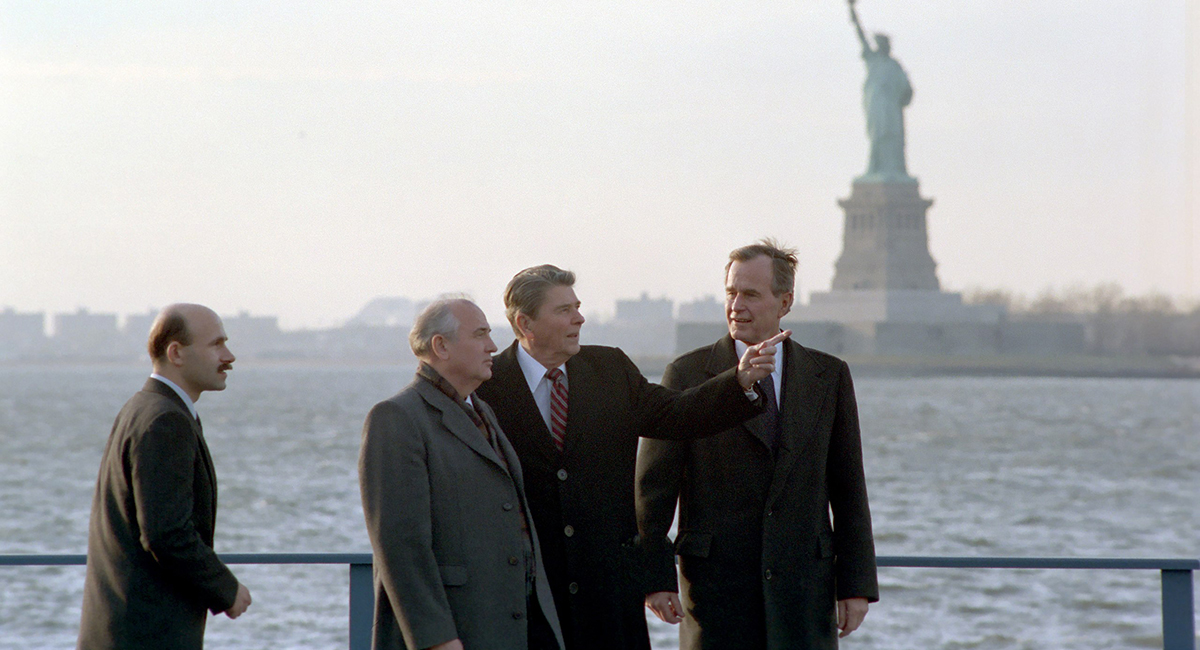風蕭蕭_Frank
以文會友美國能重蹈蘇聯覆轍嗎?
https://www.independent.org/news/article.asp?id=14271
2022年9月7日 JUDY L. SHELTON 朱迪·謝爾頓 - 獨立研究所的高級研究員、國家民主基金會前主席、歐洲複興開發銀行前美國董事。
昆尼皮亞克大學進行的一項令人不安的新民意調查發現,67% 的美國人擔心美國的民主麵臨崩潰的危險。這可能嗎? 這對美國的未來意味著什麽? 現在進行重大路線修正是否為時已晚?
該民意調查結果於周三公布,即蘇聯最後一位領導人米哈伊爾·戈爾巴喬夫去世後的第二天。 對於戈爾巴喬夫來說,似乎不可能想象蘇維埃社會主義共和國聯盟——共產主義堡壘、軍事超級大國——會崩潰。
但它確實做到了。 這個橫跨大陸的國家於1922年12月在弗拉基米爾·列寧的領導下通過條約成立,並於1991年12月正式解散。然而,當戈爾巴喬夫於1985年3月上台擔任總書記時,他的目標不是使國家解體,而是加強國家實力。並鞏固它。
戈爾巴喬夫主要從經濟角度看待主要挑戰:社會主義學說認為經濟力量可以完美協調以實現效率最大化,但腐敗和金融管理不善導致了經濟停滯和工人不滿。
戈爾巴喬夫提出的補救措施是提高國內經濟重組(perestroika)必要性的透明度(glasnost),同時尋求國外投資資本來為轉型提供資金。
作為全球政治舞台上冉冉升起的新星,戈爾巴喬夫成功地與瑪格麗特·撒切爾等精明的領導人建立了友誼。撒切爾在 1979 年至 1990 年間擔任英國首相,並曾宣布西方和新的蘇聯領導人“可以一起做生意”。 ”
敵對行動的緩和為蘇聯通過無數新選擇借款打開了大門。 除了從西方商業銀行獲得貸款並允許外國人通過合資企業將資本引入蘇聯外,戈爾巴喬夫還與英國和瑞士就未償沙皇債務達成和解,並於1988年1月在國際資本市場上發行了蘇聯首次公開債券。
然而,在戈爾巴喬夫的個人魅力和與西方國家加強合作關係的呼籲之下,卻隱藏著日益增長的焦慮感。開放和改革越暴露出中央計劃模式核心的腐敗,就越需要確保為進口消費品和技術提供資金,以滿足蘇聯日益不安的公民並增強其日益昂貴的軍事能力。
我自己作為斯坦福大學胡佛研究所博士後獎學金的獲得者,開始參與這些曆史發展。 由於擔心缺乏有關蘇聯債務的全麵統計數據,我於1984年11月提交了一份建議,分析西方資本對蘇聯經濟的影響。
初步研究表明,公布的西方政府和商業銀行貸款數據明顯低估了風險敞口水平; 此外,我懷疑蘇聯的內部財政和貨幣狀況遠比其政府聲稱的要糟糕。
不過,這個故事最終將遠遠超出簡單地指責一個可能無力償還債務的主要借款國的情況。我的學術分析被轉化為一本公共政策書籍,題為《即將到來的蘇聯崩潰:戈爾巴喬夫在西方金融市場對信貸的絕望追求》。
這將導致蘇聯即將破產這一看似難以置信的斷言。如果我們的冷戰對手在經濟上不再可行,這對西方意味著什麽? 如果蘇聯被剝奪了西方資本,它還能作為一個政治實體、一個軍事超級大國繼續存在嗎?
最初的國際銀行問題變成了國家安全的關鍵問題,對西方國防聯盟具有戰略影響。 我以前對蘇聯賬本的綠眼審查將演變成五角大樓讚助的兵棋推演,學術理論化讓位於對難以想象的場景的清醒思考。
所有這些並不意味著美國正在走一條經濟衰退和政治不滿並行的道路。 盡管如此,隨著政府支出繼續超過收入,我們國家的財政狀況穩步下降,仍然令人不安。
“對蘇聯持續的全球權威及其作為社會主義運作模式的地位的最大威脅是它所承受的巨額預算赤字,”我在 1989年的書中肯定道。“多年來,克裏姆林宮不得不通過印鈔來彌補長期的收入短缺。無論該體係的意識形態原則如何,這都會導致通貨膨脹。”
戈爾巴喬夫統治下的蘇聯即將麵臨的財政和貨幣崩潰,加上其日益惡化的道德破產:在一黨社會主義下建立工人天堂的願景未能兌現其承諾。
當公民對定義他們國家的基本前提和原則失去信心並證明他們對國家的忠誠是正當的時,這必須被視為對其領導人的一個真誠的警告信號。
美國主張民主資本主義。我們需要重申對健全財政和健全貨幣的承諾,作為致力於個人自由、自由市場成果、機會和繁榮的自治國家的適當基礎。
Could America Go the Way of the Soviet Union?
https://www.independent.org/news/article.asp?id=14271
Sept 7, 2022 By JUDY L. SHELTON

A disturbing new poll conducted by Quinnipiac University finds that 67 percent of Americans are concerned that democracy in the United States is in danger of collapse. Can this be possible? What does it mean for the future of the United States? Is it too late to bring about a major course correction?
The poll’s findings were published on Wednesday—one day after the death of Mikhail Gorbachev, the last leader of the Soviet Union. For Gorbachev, it must have seemed just as impossible to conceive that the Union of Soviet Socialist Republics—a bastion of communism, a military superpower—would ever collapse.
And yet it did. The continent-spanning nation that was formed by treaty in December 1922 under Vladimir Lenin was officially dissolved in December 1991. Yet when Gorbachev came into power as General Secretary in March 1985, his goal was not to cause the country to disintegrate but rather to strengthen and solidify it.
Gorbachev saw the chief challenge mostly in economic terms: Socialist doctrine assumes that economic forces can be perfectly coordinated to maximize efficiency, but corruption and financial mismanagement had brought about stagnation and worker discontent.
Gorbachev’s proposed remedy was to permit more transparency (glasnost) about the need for economic restructuring (perestroika) at home—while also pursuing investment capital from abroad to fund the transformation.
A rising star on the global political stage, Gorbachev was successful in cultivating friendships with such canny leaders as Margaret Thatcher, who was Britain’s prime minister between 1979 and 1990 and who famously announced that the West and the new Soviet leader “can do business together.”
This thaw in hostilities opened the door for Soviet borrowing through a myriad of new options. In addition to obtaining loans from Western commercial banks and permitting foreigners to channel capital into the Soviet Union through joint ventures, Gorbachev settled with Britain and Switzerland on outstanding tsarist debts and floated the Soviet Union’s first public bond offering on international capital markets in January 1988.
Yet beneath Gorbachev’s personal charm and appeal for more cooperative relations with Western nations was a growing sense of anxiety. The more glasnost and perestroika exposed the rottenness at the core of the central planning model, the more critical it became to secure funding for imported consumer goods and technology to satisfy the Soviet Union’s increasingly restless citizens and augment its increasingly expensive military capabilities.
My own involvement with these historical developments begins to coincide at this point—as the recipient of a postdoctoral fellowship at the Hoover Institution at Stanford University. Concerned about the lack of comprehensive statistics on Soviet indebtedness, I had submitted a proposal in November 1984 to analyze the impact of Western capital on the Soviet economy.
Initial research indicated that published data on loans from Western governments and commercial banks significantly understated the level of exposure; moreover, I suspected that the internal fiscal and monetary condition of the Soviet Union was far worse than its government claimed.
The story, though, would end up going considerably beyond simply pointing fingers at a major borrowing nation that would likely prove incapable of paying back its debts. My scholarly analysis was transformed into a public policy book entitled “The Coming Soviet Crash: Gorbachev’s Desperate Pursuit of Credit in Western Financial Markets.”
It would make the seemingly implausible assertion that the Soviet Union was going bankrupt. And if our Cold War nemesis were no longer economically viable, what would that mean for the West? Could the Soviet Union continue to exist as a political entity, as a military superpower, were it deprived of Western capital?
What had started as an international banking concern turned into a critical matter of national security with strategic implications for the Western defense alliance. My former green-eyeshade scrutiny of Soviet ledgers would evolve into Pentagon-sponsored wargaming exercises, and academic theorizing gave way to sober contemplation of unimaginable scenarios.
All of which is not to suggest that the United States is treading a parallel path of economic dissipation and political discontent. Still, it is disturbing to witness the steady decline of our nation’s fiscal condition as government expenditures continue to exceed revenues.
“The biggest threat to the continued global authority of the Soviet Union and its status as a working model of socialism is the massive budget deficit it is carrying,” my 1989 book affirms. “For years, the Kremlin has had to resort to printing money to paper over chronic revenue shortfalls. That is a recipe for inflation, no matter what the ideological tenets of the system.”
The Soviet Union’s pending fiscal and monetary breakdown under Gorbachev’s reign was compounded by its worsening moral bankruptcy: The founding vision of a workers’ paradise under one-party socialism had failed to deliver on its promises.
When citizens lose faith in the basic premise and principles that define their nation—and justify their allegiance to it—it must be taken as an earnest warning sign for its leaders.
The United States stands for democratic capitalism. We need to renew our commitment to sound finances and sound money as the appropriate foundation for a self-ruling nation devoted to personal liberty, free-market outcomes, opportunity, and prosperity.
 JUDY L. SHELTON is a Senior Fellow at the Independent Institute, former Chairman of the National Endowment for Democracy, and former U.S. Director of the European Bank for Reconstruction and Development.
JUDY L. SHELTON is a Senior Fellow at the Independent Institute, former Chairman of the National Endowment for Democracy, and former U.S. Director of the European Bank for Reconstruction and Development.




